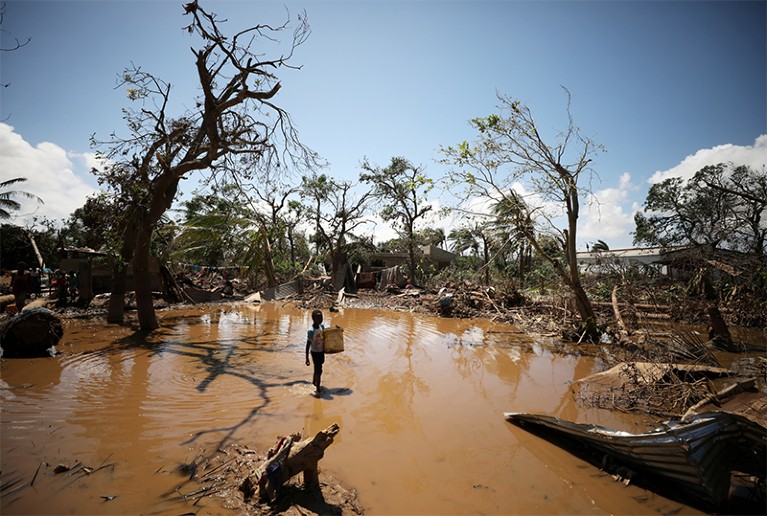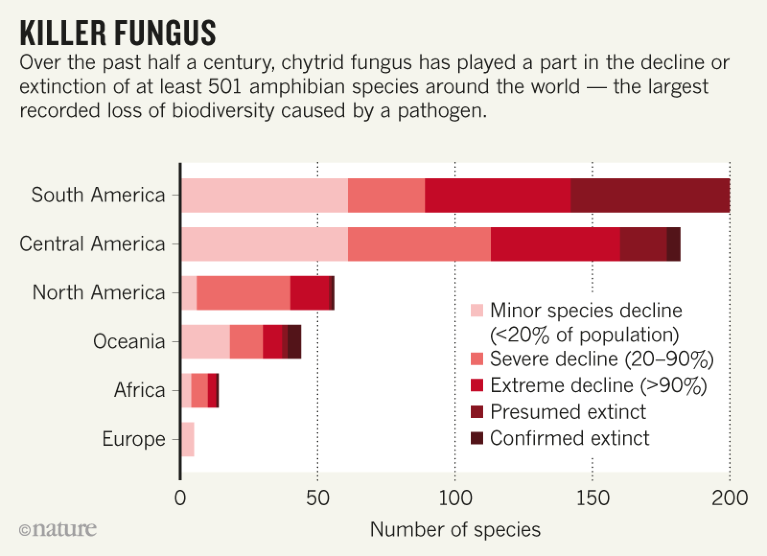EVENTS
Cholera hits in wake of Africa cyclone Cholera has broken out in the wake of Cyclone Idai in Mozambique. As of 1 April, health officials have reported more than 1,000 cases of the disease, as well as one death, as towns struggle to provide clean water and sanitation to residents in the cyclone’s aftermath. Idai struck the region on 14 March. Cholera causes watery diarrhoea that dehydrates people rapidly, and is especially deadly for children. The World Health Organization shipped 900,000 doses of cholera vaccine to the country last week, along with treatments for malaria. At least 780 people have been killed and an estimated 230,000 have been displaced by Idai in Mozambique, Zimbabwe and Malawi. Officials expect those numbers to climb.

Flooding in the wake of Cyclone Idai, which hit southeastern Africa last month, has displaced hundreds of thousands of people.Credit: Mike Hutchings/Reuters
GPS date bug A bug in the US Global Positioning System (GPS) means that some data loggers — including scientific instruments such as seismometers — that use the service to keep ultraprecise time could malfunction starting on 6 April. GPS satellites broadcast a signal that includes a ‘week number’ in GPS time — which officially started on 6 January 1980 — as a binary ten-digit code. Receivers use the number to calculate the exact date and time. But ten digits covers only 1,024 weeks, or 19.7 years, a limit that will be reached for the second time just before midnight universal time on 6 April, when GPS satellites’ week counter will reset to 0. Instruments with older firmware — software programmed into their permanent memory — risk misinterpreting the week 0 as being in the past, and could begin generating erroneous data. Instrument-makers have urged users to check their devices’ susceptibility, and have provided firmware and other updates to fix the issue.
CLINICAL TRIALS
Trial transparency Many leading US universities are breaking the law by failing to make public the results of their clinical trials. A report published on 25 March found that 25 of the 40 universities that sponsor the most trials in the United States did not post study results on a public, government registry within 12 months of trial completion, as is required by a 2007 US law that came fully into effect in 2017. The analysis looked at 450 trials that had been done by these universities since January 2017 and were due to be reported. It found that 31% of those were missing from ClinicalTrials.gov (see go.nature.com/2u86zma). The study, which was carried out by organizations that campaign for transparency in medical research, found that 15 of the 40 universities had complied fully with the law.
Drug regulations India has announced new rules for clinical trials that will speed up drug approvals and remove the requirement for large studies to test the efficacy of drugs that have already been approved in other countries. Pharmaceutical companies that want to sell a new drug will no longer have to test its efficacy and safety in the Indian population, as long as it has been approved for sale in the European Union, the United Kingdom, Australia, Canada, Japan or the United States. India’s drug regulator, the Central Drugs Standard Control Organization, will now have 90 days to decide whether to approve global clinical trials. Previously, such decisions could take up to six months. The government hopes the rules, effective immediately, will increase and improve clinical research in India, which hosts only 1.2% of the world’s clinical trials despite having a high burden of disease.
SCIENTIFIC COMMUNITY
Ecology at risk The global rise in political populism and nationalism is creating a ‘landscape of fear’ that is threatening the work and personal freedoms of ecologists, say the authors of an editorial in the Journal of Applied Ecology (N. W. Pettorelli et al. J. Appl. Ecol. http://doi.org/c33q; 2019). Scientists face a public that is increasingly distrustful of their work, say the authors, but changes to government policies are bringing ecologists, who document and address environmental challenges, into direct conflict with policymakers. In Brazil, government reshuffles have weakened or obliterated departments tasked with protecting the environment. In the United States and elsewhere, gag orders on scientists limit their ability to openly discuss their work, and politicians ignore or discredit scientific evidence during decision-making processes, the editorial says.
SPACE
Satellite destroyed India has destroyed one of its own satellites in an anti-satellite missile test. The country is now the fourth, after the United States, Russia and China, to have anti-satellite capabilities. A ballistic missile destroyed the craft at around 300 kilometres altitude, the Indian government announced on 27 March (pictured, celebrations after the announcement). That places most of the debris below the orbit of the International Space Station. A US military official told the US Congress that the military was tracking at least 270 pieces of space junk from the test.

People in India celebrated after Prime Minister Narendra Modi declared that the country had become a space power.Credit: Amit Dave/Reuters
Lunar ambition US astronauts will return to the Moon by 2024, US vice-president Mike Pence said on 26 March at a meeting of the National Space Council in Huntsville, Alabama. Pence says that NASA plans to land astronauts near the lunar south pole. The goal is highly ambitious, given that NASA currently does not have its own way of flying astronauts into low-Earth orbit, much less into deep space — although rockets able to do so are being developed. The move accelerates NASA’s previously announced plans to return to the Moon.
AWARDS
AI pioneers Three pioneers of the artificial intelligence (AI) technique called deep learning have won the Turing award, considered by many to be the top recognition in computer science. This year’s award, formally designated the 2018 prize, is shared by Canada-based researchers Yoshua Bengio of the University of Montreal and Google’s Geoffrey Hinton, along with US-based Yann LeCun of Facebook. The three computer scientists have worked to add layers of complexity to artificial neural networks — a computational technique inspired by the brain’s visual cortex — since the early 2000s, a time when they had fallen out of fashion among the AI community. Bengio, Hinton and LeCun will share the prize’s US$1 million. The Association for Computing Machinery, an international society based in New York City, assigns the award with financial support from Google.
FUNDING
Nuclear-fusion lab The Joint European Torus (JET), a nuclear-fusion laboratory in Culham, UK, has secured a funding contract with the European Union that will allow it to run until the end of 2020. The future of the lab was thrown into uncertainty in 2017 when the UK government announced that leaving the EU meant it would also leave the Euratom Treaty, the bloc’s nuclear-regulation agreement under which the lab is funded. JET — which is testing fuel technologies for the world’s largest fusion experiment, ITER, in southern France — will receive at least €100 million (US$112 million) over the next two years from the European Commission. The UK government says that the contract leaves open the option of extending JET’s operations until 2024. UK chancellor of the exchequer Philip Hammond had promised to fund the lab in the coming year if an EU funding deal wasn’t reached by 28 March, when JET’s previous contract ran out.
TREND WATCH
A frog-killing fungus is responsible for the decline of more species than any other pathogen on record, a global analysis has found. The study, published on 28 March in Science, reveals that chytrid fungi caused the decline of hundreds of species worldwide, including 90 that have become extinct. The fungi normally live in soil and water, where they break down dead organic material. But the species Batrachochytrium dendrobatidis causes a deadly disease called chytridiomycosis in amphibians. It attacks their skin and prevents them from properly regulating their salt and water levels; this eventually causes the animals’ hearts to stop. Researchers realized that this fungus was responsible for declines in amphibian populations in South America, Central America and Australia, where it had been introduced through the wildlife trade. A team of 41 ecologists and other experts around the world gathered evidence on which species had been affected by chytrid fungi by scouring the scientific literature and unpublished data, as well as interviewing other specialists. The team found that the fungus was probably involved in the declines of at least 500 amphibian species between 1965 and 2015.

Source: B. C. Scheele et al. Science 363, 1459–1463 (2019).






